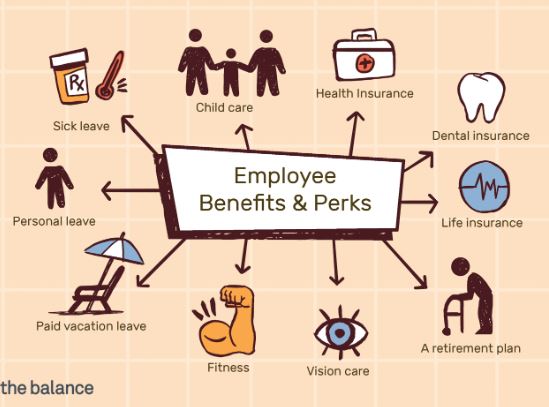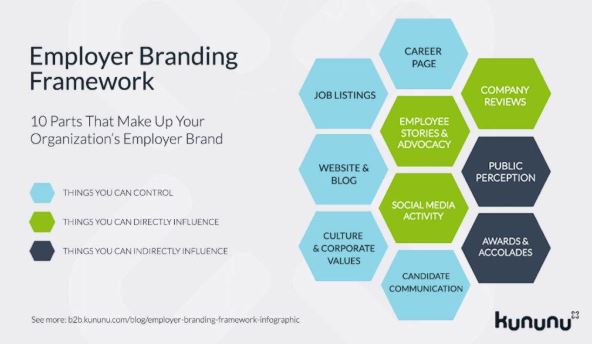
Introduction
EVP (Employee Value Proposition) can be closely linked to employer branding. According to TalentLyft, employee value proposition is defined as the balance between the rewards employees receive in exchange for their contribution to the company.
In this overview, we are going to look at some of the ways these two important HR concepts complement each other. Also, we will present advice and ways how recruiters can use EVP to attract the top talent in their industry.
This guide should be valuable to all recruiters and HR experts, because these team members are primarily responsible for communicating EVPs to new and existing employees. Also, it should be interesting to anyone who is interested in innovation in recruitment.
Examples of EVP
Employee value proposition encompasses all of the values a company offers to attract top talent and retain current employees.
Here are some of the most important aspects of employee value proposition:
- compensation (salary and commission)
- benefits (401k, insurance)
- paid vacation
- bonuses and rewards
- flexible working hours
- possibility to work from home
- office perks
The company can also come up with original and custom-made value proposition that will help it tailor the workplace according to needs and desires of current and future employees. For example, a young mother would probably rather receive extra vacation days or work-from-home possibility than commission-based bonuses.
The task of the HR department within each company is to know the team members so well that the company can offer them the optimal package of perks.
Attracting new employees through value proposition is a whole another story. By including EVP on a job listing, the company provides a general overview of what’s it like to work there for the general public.
According to Lift Human, a high-quality EVP can improve commitment of new employees by 29% and decrease yearly employee turnover by 69%.
Employer Brand
Most people think employer branding is interchangeable with company branding. However, the company brand is a wider term which actually overarches employer brand. Company branding encompasses everything from goodwill and social responsibility to financial success and product popularity.
There are millions of examples out there of companies that enjoy a terrific reputation for their products and operations, but are known as not-so-great employers. And of course, vice versa: companies that offer some of the best perks in their respective industries can have a relatively bad reputation among the general public (e.g. oil and gas companies, big tech, pharmaceutical companies, etc.)
However, in many cases, employer branding directly links to the EVP the company is known to offer.
For example, one of the best-known companies in the world, Google, owes a huge chunk of its great company branding to employer branding.
Google has achieved impeccable employer reputation through dozens of top perks they offer to their employees. According to the company, here are some of the best EVPs for the top talent looking to join Google:
- 15 days of paid time off for first-year employees
- a 50% 401k match for up to 8,250 USD
- free buffet, healthy meals and snacks
- on-site gyms
- pet-friendly offices in certain cities

Other tech companies are also well-known for great employee perks, which is one of the reasons they have upheld a strong reputation in the previous decades.
According to Business Insider, Amazon offers a lot of different EVPs; from free breakfast and a juice bar and daily catered food, to Friday happy hours and free transportation.
How to Utilize EVP to Succeed in Employer Branding?
There is no way around it: if you want to achieve a brand of an awesome employer, you need to offer benefits to match. It’s downright impossible to be known as a great employer, while offering very little to employees at the same time.
Many companies have tried to do this through business storytelling on social media, but EVPs always resurface through word of mouth.

If employer branding is your company’s priority, all decision-makers have to sit down and clearly outline what the company will offer to its employees.
Whether you like it or not, your company will develop an employer reputation. Your best chance for attracting and retaining top talent is to make sure you form your own narrative on what is it like to work at your company.
If you’re silent about it, the industry is going to talk about it nevertheless. So, for example, even if you don’t list a compensation package in your job ad, applicants will quickly find out the information through word of mouth, social media and forums.
Conclusion
If you want to provide better EVPs without harming your revenues or profit, you have to find the magic balance between employee satisfaction and company budgeting.
If your company aims to attract top talent, you will simply have to provide top compensation to start with. Otherwise, the best candidates will join one of the thousands of companies offering great wages.
For HR experts, it’s crucial to constantly keep your ear to the ground and anticipate the wishes and needs of your company’s employees. When it’s time to upgrade the EVP before a new job position listing, recruiters and HR team members should directly communicate this to management.
Human resources should constantly work to provide facts and statistics related to employee satisfaction to the company’s management.
The ultimate goal that you can achieve through quality EVP and employer branding is that your current employees become your loudest advocates. If people are happy within a company, they will surely spread the word. However, keep in mind that people talk, especially if there are negative things to point out about the company!














